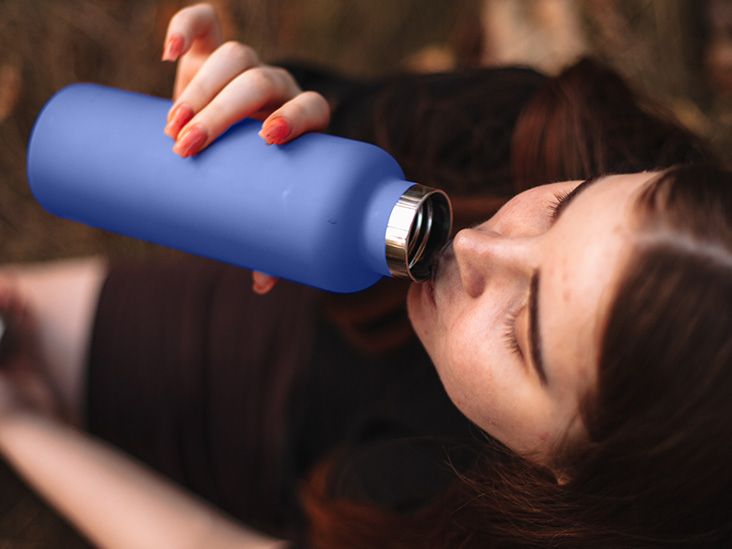Tea is a beverage made by steeping the leaves of the tea plant in boiling water. Many teas and some herbal infusions have health-boosting properties and may support blood sugar regulation.
All true teas, whether black, green, or Oolong, come from the same Camellia sinensis plant.
However, herbal infusions are not made from the same plant. Rather, they are made with different herbs and fruits, such as chamomile, mint, and hibiscus. Nonetheless, herbal infusions are sometimes referred to as tea.
This article explores the different types of tea and herbal infusions and how they may affect blood sugar levels.

True tea
Tea is a popular beverage, consumed by nearly half of the U.S. population. True tea is made from the leaves of the tea plant (Camellia sinensis), and variations include:
- black tea
- green tea
- Oolong tea
- white tea
- pu-erh tea
All of these teas originate from the same plant and contain caffeine. However, they each undergo different processing methods.
Research suggests that the polyphenols in green tea might have protective effects against autoimmune diseases, like type 1 diabetes, and reduce the risk of cancer, cardiovascular diseases, and metabolic disorders.
Similarly, black tea is thought to protect against chronic disorders, reduce the risk of heart disorders, and stabilize blood sugar.
Herbal infusions
Herbal or fruit infusions are also known as “tisanes.” They are also often called “teas,” even though they do not contain leaves from the tea plant.
Herbal infusions can be made from the leaves, stems, roots, fruits, buds, and flowers of virtually any edible fruit or herb. Health benefits vary according to their ingredients and bioactive compounds.
A 2021 review listed the following health benefits of some common herbal infusions:
- Ginger: anti-inflammatory and antitumor effects
- Hibiscus: anti-inflammatory and anti-obesity effects
- Lemongrass: anticancer properties
- Safflower: boosts the immune system and has cardioprotective effects
- Jasmine: antioxidant properties and reduces stress
Both true teas and herbal infusions have potential health benefits for blood sugar regulation.
Black tea
Black tea may help manage blood sugar levels. In a
Chamomile
According to a
With this in mind, it is possible that chamomile tea could support better blood sugar management. However, more clinical research is needed to confirm this.
Cinnamon
Cinnamon tea may help reduce blood sugar levels.
In an older study involving 30 people with normal blood sugar levels, drinking 3.5 ounces of cinnamon tea before drinking a sugar solution resulted in lower blood sugar levels compared to a control group.
However, a more
Ultimately, further research is needed to determine the specific effects of cinnamon tea.
Hibiscus
A 2022 review suggests that hibiscus has a positive impact on blood sugar regulation.
Indeed, there is evidence that hibiscus may have the following effects in people and animals with diabetes:
- lower blood sugar levels
- boost insulin production
- reduce insulin resistance
Lemon balm
Some studies have investigated the effect of lemon balm essential oil on blood sugar and antioxidant activity.
In a 2010 study, mice with diabetes were given a diluted form of the oil for 6 weeks. This was found to effectively neutralize harmful free radicals, increase insulin levels, encourage better glucose tolerance, and reduce blood glucose and triglyceride levels by 65%.
However, further clinical studies focusing specifically on lemon balm tea are needed to confirm these effects in humans.
Turmeric
Turmeric contains the active ingredient curcumin.
A recent review of 61 studies showed that turmeric supplements can reduce blood glucose levels in individuals with type 2 diabetes, prediabetes, and metabolic syndrome.
These effects were attributed to curcumin and other compounds found in the spice, which affect different cellular pathways within the body. They support insulin function, reduce inflammation, and improve metabolic health.
However, further studies are needed to confirm the long-term benefits of turmeric for blood sugar regulation.
Although consuming tea and herbal infusions can be a good choice for blood sugar regulation, people should be wary of sweetening their beverages with too much sugar or honey as this can have a counterintuitive effect.
Indeed, a growing body of research has linked habitual intake of sugar-sweetened beverages with an increased risk of developing type 2 diabetes.
If a person is drinking true tea, they can add lemon or other fruits and herbs to help flavor the tea without adding sugar.
Packaged tea and herbal infusion products may also contain added sugars, so it is essential to check the ingredients.
Additionally, some herbal infusions may interact with medications that affect blood sugar, such as diabetes medications. For example, prickly pear may interact with glipizide and metformin. Therefore, people should check with their doctor about any possible interactions between their medication and herbal teas.
Will tea raise blood sugar?
Unsweetened tea does not typically raise blood sugar significantly. However, depending on how much a person adds to their drink, adding sugar or honey to a cup of tea may lead to a spike in blood sugar levels.
It is important for people who are managing their blood sugar to be mindful of any sweet additions to their tea.
What tea should people with diabetes avoid?
People with diabetes should generally limit or avoid the following teas:
- sweetened teas
- sweetened ice teas
- herbal teas blended with sweeteners or added sugars
Tea and herbal infusions are popular beverages that may have beneficial effects on blood sugar regulation.
People with type 2 diabetes should avoid sweetening their tea or herbal infusions with sugar or honey. They should also confirm with their doctor that herbal teas will not interfere with any medications for diabetes.

